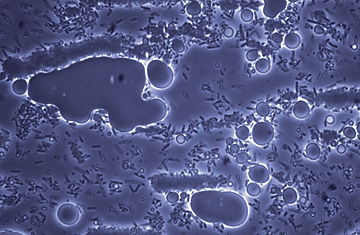
Food versus fuel. That debate has held back progress in biofuels, which offer the promise of a low-carbon substitute for petroleum, but whose development could also exacerbate deforestation and other environmental ills. But what if you could genetically engineer a better brand of biofuel — one that's richer in energy and lower in carbon? That's exactly what Jack Newman and his team at Amyris Biotechnologies are doing. Biofuel is often made by unleashing bacteria or yeast on a feedstock, like corn or sugarcane — through fermentation, the microbes convert the energy contained in the feedstock into a fuel like ethanol. Amyris can tweak the genetic structure of those microbes, turning them into better fuel factories and creating ethanols and biodiesel that are far superior to those made directly from plants like corn or sugar cane. The result could be biofuel that is cheaper than petroleum and a lot more environmentally friendly, with a carbon footprint 80% smaller than oil's. Newman and his colleagues have already used their synthetic biology techniques to make affordable malaria medicine — now they just have to take on climate change. "We can make any molecule we put our mind to," says Newman. "There's no question in my mind — technology can save us."